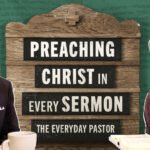Christmastime is here. For some of you, that sentence evokes nostalgia and joy. Others of you, not so much.
Yet one thing many of us share in common this time of year is hearing the classic readings from the Gospels (if not in church then from Linus). And all the while, we can become so familiar with the incarnation that we end up domesticating it.
Christmas is familiar, but it isn’t tame. As Tim Keller puts it in his book Hidden Christmas: The Surprising Truth Behind the Birth of Christ (Viking), “Christmas is both more wondrous and more threatening than we imagine.” Working from the writings of Matthew, Luke, and John, he illumines the modern import of the ancient story.
I asked Keller, former pastor of Redeemer Presbyterian Church in Manhattan and vice president of TGC, why neither the god of moralism nor the god of relativism would’ve bothered with Christmas, how unbelievers try to “name” Jesus, and more. (And yes, this brief book would make an excellent Christmas present.)
Why is Christmas “the most unsentimental, realistic way of looking at life”?
In the book I say that about the theme of “light in the darkness” that’s so prominent not only in the biblical understanding of Christ’s birth (Isa. 9:2; Matt. 4:16) but also in most contemporary celebrations of Christmas. The Bible doesn’t say “from the world a light has dawned” but “upon the world a light has dawned.” The point is that the world is a dark place that needs salvation to come from outside of it. This means the end of cheery statements like, “If we all pull together, we can make the world a better place.” No, we can’t. We don’t have what it takes.
The Bible doesn’t say ‘from the world a light has dawned’ but ‘upon the world a light has dawned.’ The world is a dark place that needs salvation to come from outside of it.
This is a clear-eyed, realistic approach to our problems. It’s not rah-rah optimism. Yet it’s not pessimistic either, because there is hope, and a certainty that God will eventually destroy all evil.
Why is it foolish to rush past the genealogy at the beginning of Matthew’s Gospel?
Matthew’s genealogy of Jesus does a lot of work. First, it roots Jesus in history. The gospel doesn’t begin “once upon a time.” Christ isn’t a legend; he was a flesh-and-blood human being in space and time. Second, the genealogy includes women who were racial and cultural “outsiders” (Rahab and Ruth) as well as involved in incest, adultery, and prostitution (Tamar, “Uriah’s wife,” and Rahab).
In ancient and less individualistic times, one’s genealogy was like one’s résumé. Like today’s résumés, many things were usually expunged to make it look better to the reader. Women were seldom put in ancient genealogies at all, let alone women who reminded readers of the sordid sins and corruption of ancestors such as Judah and David. All of these figures would have been disowned or expunged from a normal genealogy, but here they are not. They are all—male and female, king and prostitute, Jew and Gentile—equally part of Jesus’s family. So even the “begats” of the Bible drip with God’s mercy.
Neither the god of moralism nor the god of relativism would have bothered with Christmas, you observe. Why not?
Moralism is essentially the idea that you can save yourself through your good works. And this makes Christmas unnecessary. Why would God need to become human in order to live and die in our place if we can fulfill the requirements of righteousness ourselves? Relativism is essentially the idea that no one is really “lost,” that everyone should live by their own lights and determine right and wrong for themselves. The “all-accepting god of love” many modern people believe in would never have bothered with the incarnation. Such a god would have found it completely unnecessary.
The ‘all-accepting god of love’ many moderns believe in would never have bothered with the incarnation. Such a god would have found it completely unnecessary.
Why was the naming of baby Jesus significant?
All parents have the right to name their own child. It’s a sign of their authority over the child, and the power they have over how the child will live and who the child will become. This was even truer in ancient patriarchal societies than it is now. But the angel doesn’t allow Joseph or Mary to name Jesus. One reason is that Jesus was the first child ever born who was far older than his parents! The other is that, even though Jesus submitted to his human parents authority during his childhood (Luke 2:51), they weren’t ultimately his master. He was their master. By refusing to let Mary and Joseph name their son, the angel was essentially saying something like this: “If Jesus is in your life, you’re not his manager—he’s your manager. You don’t name him or tell him who he is—he’s come to tell you who you are.”
What can we learn about the difference between closed-minded doubt and open-minded doubt from contrasting Zechariah and Mary in Luke 1?
When the angel Gabriel appeared and told Zechariah he would have a son, Zechariah expressed doubts about how this could come to such an elderly couple (Luke 1:18)—and he was disciplined for his doubt (Luke 1:20). When Gabriel appears and tells Mary she will have a son, she expresses doubts to the same angel in almost the same words—wondering how this could come to a virgin (Luke 1:34). Yet there’s no word of rebuke, only a further explanation. Why the difference? The only real possibility is that the inner motivations and dynamics of Zechariah’s and Mary’s doubts were different. There’s a kind of doubt that really is seeking more information—that “wants” to believe if it’s possible. There’s also a kind of doubt that really is looking for a way out, that doesn’t want to believe or submit, that’s looking for a way to keep control of one’s own life.
This is a wonderfully nuanced approach to doubt. The Bible doesn’t view doubts as always rebellious, nor does it encourage people to live in doubt perpetually. That’s why we’re told to “be merciful to those who doubt” (Jude 1:22).
Involved in Women’s Ministry? Add This to Your Discipleship Tool Kit.
 We need one another. Yet we don’t always know how to develop deep relationships to help us grow in the Christian life. Younger believers benefit from the guidance and wisdom of more mature saints as their faith deepens. But too often, potential mentors lack clarity and training on how to engage in discipling those they can influence.
We need one another. Yet we don’t always know how to develop deep relationships to help us grow in the Christian life. Younger believers benefit from the guidance and wisdom of more mature saints as their faith deepens. But too often, potential mentors lack clarity and training on how to engage in discipling those they can influence.
Whether you’re longing to find a spiritual mentor or hoping to serve as a guide for someone else, we have a FREE resource to encourage and equip you. In Growing Together: Taking Mentoring Beyond Small Talk and Prayer Requests, Melissa Kruger, TGC’s vice president of discipleship programming, offers encouraging lessons to guide conversations that promote spiritual growth in both the mentee and mentor.

































